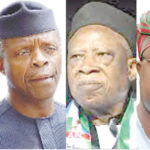With the emergence of presidential candidates who are in their 70’s in the two major parties, the All Progressives Congress (APC) and the Peoples Democratic Party (PDP), the campaign to have younger folks run for the office is deemed to have been largely lost. In this interview Abdul-Azeez Suleiman, spokesperson for the Coalition of Northern Groups (CNG), tells DARE ADEKANMBI where the younger presidential aspirants goofed, the implications of their not getting the tickets of the major parties, what the North is likely to do, among other things.
The two main political parties in Nigeria, All Progressives Congress (APC) and Peoples Democratic Party (PDP), have produced old war horses in Tinubu and Atiku as presidential candidates. How do you see these individuals?
As individuals, I would say they are both past service age in the context of the current global order running on the basis of values and practices that we, as a developing democracy, need to understand, adapt to or create alternatives that suit our cultures, circumstances and interests. The new global trend is shifting towards the younger generation.
As politicians, I don’t blame the old brigade for taking the tickets of the PDP and APC because there was a vacuum that needed to be filled. The young men in the race could not get their acts together, so the old brigade simply capitalised on their lack of preparedness.
We all know that power is not given, it is taken, and to take power from where it resides has never been easy. It requires determination, commitment, rigorous planning, wide consultations, concessions and above all sacrifice: attributes that were all lacking in the manner the young aspirants conducted themselves.
We were all along hoping that they would have a point of convergence and agree among themselves to a consensus. But each chose to go solo and they became vulnerable to the old school tactics. The elderly contenders sensed the huge vacuum in the preparedness and capacity of the young aspirants and turned it to their advantage, by simply employing the long practiced tactics of monetisation of the process.
If we must tell ourselves the truth, we first begin by looking at the parade of young aspirants whom we all believe have major roles to play in rescuing our country from the margins of irrelevance, impotence, inconsequence and decay.
But unfortunately for the younger generation, these aspirants were so blinded by inordinate ambition for power that they failed to move as a solid team, but chose to go on their individual strengths which all turned out to be weaknesses.
In the PDP for instance, we had such young hopefuls as Aminu Tambuwal, Bukola Saraki, Bala Mohammed, Peter Obi and others, but they all failed to agree to back one of them at the primary. They all went in and all of them stumbled and fell dragging with them, the fate of the future generations of Nigerians.
Similarly, the APC had such relatively young aspirants as Nwajiuba, Kayode Fayemi, Yahaya Bello, and to some extent Rotimi Amaechi and Professor Yemi Osinbajo who were all kicked out of the cup by elder Bola Tinubu because of apparent lack of unity. Overall I think it will be reasonable to admit that the young generation of Nigerians is not yet ready to replace the old brigade that has inadvertently monopolised the total available activity in the country since independence or even before.
Do you see in either of them someone who can really transform and heal the country?
At this point, we have no option but to choose between the only two alternatives presented by, particularly, the two major political parties. We have to assess their individual credentials and in the end take a risk with one of them.
Are you worried old men are the candidates in the two parties, despite the clamour for young people to take over governance? Even IBB advised that the next president should not be more than 60 years.
As I pointed out above, the young ones were apparently ill-prepared and ill-equipped to challenge the old and there cannot be a power vacuum.
President Buhari’s govt clocked seven years two weeks ago. What’s your assessment of his administration so far?
I can say there have been successes in certain areas and gross inadequacies in most others. In the North-East, for instance, which was virtually a battle field before 2015, we now have a relatively secure environment with Boko Haram pinned to enclaves.
There are also some improvements in infrastructure which have not been complemented by most state governments, particularly in the North, with the exception of perhaps Kaduna, Kano, and to some extent, Borno states.
The administration has, however, failed to improve on electricity, education, as well as failed to keep its promises to curtail, arrest and eliminate corruption from our midst. The administration has failed, for instance, to act on concerns over defence and judiciary corruption.
The worsening insecurity in the North-West and South-East are other areas in which the administration has failed to act demonstrably. There are also concerns around the economy which currently revolves around a disabling level of foreign indebtedness which is scary.
How do you see the North voting in the presidential election? Do you see a repeat of the 2015 situation where it voted for a northerner over a southerner?
The North will not vote along ethnic or regional considerations this time round; this is for sure. First, the circumstances are different from those prevailing in 2015 when the whole of the North gave in to the Buhari pull, believing he would get the nation through and out of its limitations.
Now Buhari will not be on the ballot and the northern voters have learned a lesson by now. The North will go with the best regardless of region, ethnicity or religion.
What task do you see waiting for the president of the country?
The expectations will be certainly high on the new Nigerian leader. First and most critically, he must act to blend the deep division in the country and douse the mounting regional and ethnic tensions, work for reintegration and greater unity and trust in fellow citizens and in government.
Second most important is to act quickly in the vital area of providing security of life and property for citizens, confront corruption and take meaningful steps to minimize the nation’s volume of internal and external indebtedness.






